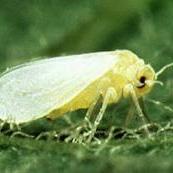TPP Collaborative Trial
Friday, November 30, 2018
Australia’s first outbreak of Tomato-Potato Psyllid (TPP) led to our collaboration with the WA Department of Primary Industries to test commercially available biological and chemical controls.
What is TPP?
Bactericera cockerelli is more commonly known as TPP. It is native to Northern America and attacks plants in the family Solanaceae, including potato, tomato, eggplant, capsicum, chilli and tamarillo.
How does TPP affect crops?
TPP damages plants by directly feeding on fruits and leaves. It can cause the disease psyllid yellows which can result in yellowing and stunting in tomato and potato plants. TPP has also been identified as the vector of Candidatus Liberibacter solanacearum (CLso), the putative causal agent of Zebra Chip disease in potato. This disease that has not yet been detected in Australia.
How is TPP currently controlled?
Growers in countries like New Zealand havestopped Integrated Pest Management programs due to frequent use of pesticides that are toxic to beneficials.
Can biological agents control TPP?
We worked with the WA Department of Primary Industries to test the control of TPP in capsicum, tomato and potato in a glasshouse using IPM-compatible pesticides and beneficial insects.
We artificially inoculated all plants with gravid females three times, at three-week intervals to simulate the migration of adults during a cropping season and tested a range of controls:
• Insecticides – abamectin, cyantraniliprole, flonicamid, spirotetramat and pymetrozine
• Biologicals – commercially produced brown lacewing (Micromus tasmaniae), mirid bug (Nesidiocoris tenuis) and minute flower bug (Orius tantillus).
What did we learn from our trials?
There is potential to control TPP in tomato using Nesidiocoris. The insecticide flonicamid provided good suppression in tomato. Abamectin, cyantraniliprole and spirotetramat provided good control in capsicum, tomato and potato.
The next step would be to replicate the study in commercial scale glasshouses and field trials, to test whether an integrated program using both biological control agents and insecticides can be compatible and effective.
The take out for growers
The good news for WA growers currently running IPM programs with Nesidiocoris is that you should not need to alter your management program when TPP is detected.
The research also showed there to be a number of IPM-compatible insecticides that can be used with crops like capsicums that should not interfere with the IPM programs currently being used.








